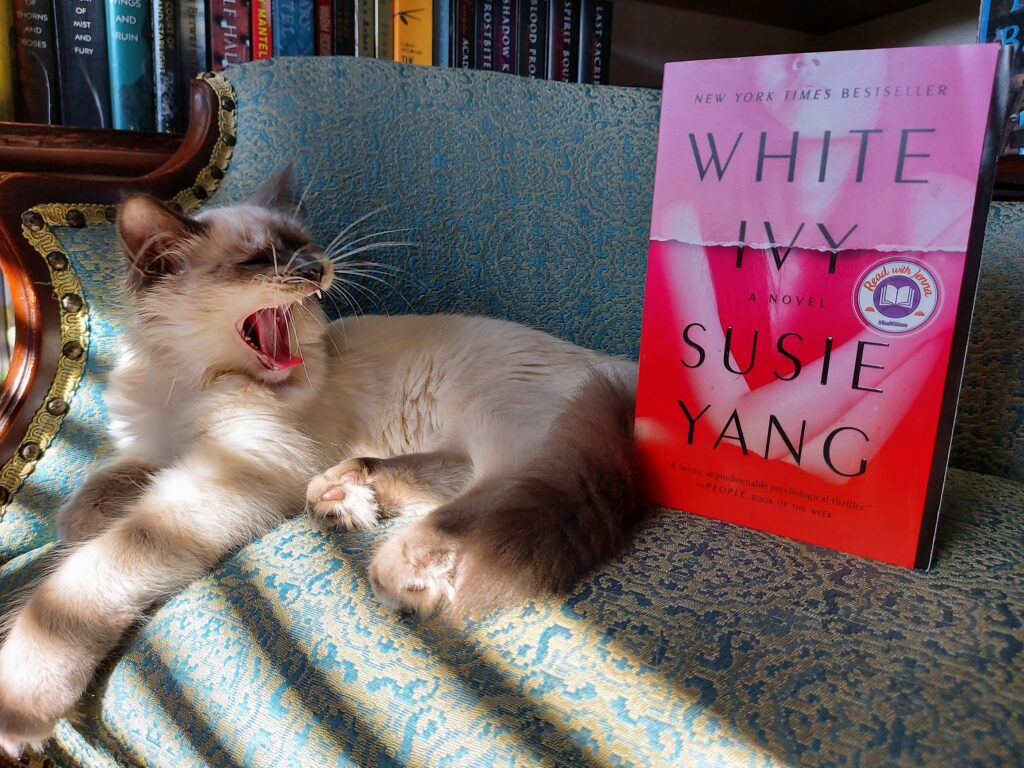White Ivy by Susie Yang

If you were to reduce its plot to the simplest of terms, then White Ivy is not a very original novel. It is a story about a poor and unremarkable person who wants to belong to the wealthy and important crowd. It is a story that has been told repeatedly. White Ivy has been compared to Donna Tartt’s The Secret History, which I did not like. There are certainly parallels between the two novels, especially the fate of one of the characters in White Ivy which mirrors that of Bunny in The Secret History, but I like White Ivy because it tells its story from the perspective of a Chinese American protagonist, a complicated woman who you can empathize with (up to a certain point), and it is as much about the immigrant experience in America as it is about a social climber.
White Ivy is about a Chinese immigrant named Ivy Lin, who was raised by her grandmother, Meifeng, in China while her parents went to America to get established in a new life there. When Ivy is five, her parents send for her and she comes to America (Massachusetts to be exact) to find that she has a younger brother and that her parents have low paying jobs and are poor, like most other immigrants who come to America in pursuit of the “American Dream”. Ivy’s mother is a “Tiger Mom”; she is super strict to the point of abusiveness and has very high expectations for Ivy and her brother’s future – she wants them both to become doctors. Ivy’s parents impose their Asian sense of work ethic and familial loyalty on the children that they decide to raise in America, and it blows back on them.
Meifeng joins Ivy’s family in America a few years later, and from Meifeng Ivy learns that in order to get what she wants, she has to steal it. Ivy also starts hanging out with the neighbourhood “bad boy” Roux, who is a few years older than her; he is the only person that she confesses that she shoplifts to.
When she is thirteen, Ivy attends a private school because her father works there as an IT technician. Ivy is one of very few Asian students at this private school and does not have any friends. She wishes she could be like the beautiful, popular white girls at school and develops a crush on handsome and athletic Gideon Speyer. Gideon is actually quite nice to her and invites her to a sleepover at his house. She lies to her mother and says that she is staying at another friend’s house, but of course her mother finds out and loses it. As punishment, Ivy is sent to China to spend the summer with relatives.
But it is in China where Ivy gets her first taste of luxurious wealth and the power that even the appearance of wealth has over people, and she decides that she will do whatever it takes to have that appearance of wealth for the rest of her life. She goes back to America eager to see Gideon again but finds out that her parents have bought a decrepit house and moved her family to New Jersey while she was away.
Determined to get away from her lower-income family, Ivy moves back to Massachusetts to go to college and is working as an elementary school teacher when a chance encounter leads to her reconnecting with Gideon. By this point, Ivy has carefully curated her image and gotten into debt to become the kind of woman that a man like Gideon should want as his wife, and they begin dating. Gideon’s old Bostonian WASP family is surprising progressive by welcoming her to the family, but Gideon himself is not passionate towards Ivy and is somewhat aloof (it is pretty obvious why to the reader, and I have a hard time believing that Ivy does not figure it out).
When Ivy starts dating Gideon, Roux, not surprisingly, also comes back into Ivy’s life, but he is now wealthy and a successful businessman with possible ties to the mob. He certainly does not look the part of a respectable, wealthy man, but Ivy cannot help being attracted to him. Ivy finds herself caught between two very different men, but which of them does she really want? Gideon and his family’s respectability and appearance of wealth, or disreputable Roux and his money because he knows her better than anyone else in her life?
Ivy is not a likeable character, and she is definitely not a good character, but it is not difficult to understand why an immigrant like Ivy would be desperate to assimilate into white, American culture, why she escapes her chaotic and poor upbringing and rejects her family to find more stable and loving relationships with people like the Speyer’s. Ivy is very self-aware for a character, even if she is deluded about certain things. She knows that she is a bad person. She is also a conflicted person, waffling back and forth between feeling guilt for the way she treats people, for being a liar and a thief, and justifying her behaviour. But in the end, Ivy’s ambition knows no limitations, and she ends up taking very drastic measures to get what she wants.
The ending of the novel is the one that Ivy wants, but is it the one that she deserves? It depends on how you look at it. It is not what I would want, but then again, I am not Ivy and I have not deceived myself into thinking it is a happy ending. White Ivy is the kind of novel that will have you pondering your own ambitious nature and questioning how far you would go to get what you think you deserve.